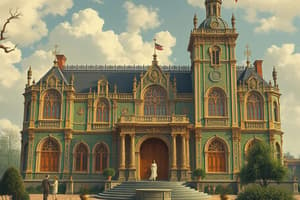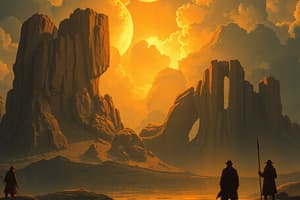Podcast
Questions and Answers
What was the earlier focus of historians?
What was the earlier focus of historians?
- change over time
- causes of battles
- rulers' biographies
- dates of significant events (correct)
Why do we refer to time in history?
Why do we refer to time in history?
- to know how to travel long distances
- to know the names of rulers
- to compare the past with the present (correct)
- to know the exact dates of events
What is history about, according to the passage?
What is history about, according to the passage?
- changes that occur over time (correct)
- rulers and their reigns
- finding out how things were in the past only
- comparing the past with the present only
What triggers our curiosity to ask historical questions?
What triggers our curiosity to ask historical questions?
What might we wonder about when watching someone sip a cup of tea?
What might we wonder about when watching someone sip a cup of tea?
What might we ask ourselves when reading the newspaper?
What might we ask ourselves when reading the newspaper?
Which of the following is the most accurate statement about the use of dates in history?
Which of the following is the most accurate statement about the use of dates in history?
Based on the passage, what is the primary reason for associating history with specific dates?
Based on the passage, what is the primary reason for associating history with specific dates?
Which of the following concepts does the passage NOT explicitly relate to the issue of dating historical events?
Which of the following concepts does the passage NOT explicitly relate to the issue of dating historical events?
What does the author suggest is problematic about fixing precise dates to historical processes?
What does the author suggest is problematic about fixing precise dates to historical processes?
According to the passage, what is a more accurate way to understand historical processes?
According to the passage, what is a more accurate way to understand historical processes?
The passage implicitly criticizes a particular approach to history. What is this approach?
The passage implicitly criticizes a particular approach to history. What is this approach?
The passage uses the example of tea drinking in India to illustrate what point?
The passage uses the example of tea drinking in India to illustrate what point?
What is the author's main argument regarding the use of dates in history?
What is the author's main argument regarding the use of dates in history?
Which of the following statements best reflects the author's view on the relationship between history and time?
Which of the following statements best reflects the author's view on the relationship between history and time?
What is the primary purpose of the passage?
What is the primary purpose of the passage?
Flashcards are hidden until you start studying
Study Notes
Understanding History
- History is about changes that occur over time, finding out how things were in the past and how they have changed.
The Role of Time in History
- When comparing the past with the present, we refer to time, using concepts like "before" and "after".
Historical Questions
- We take things for granted, assuming they have always been in our world.
- Moments of wonder spark historical curiosity, leading to questions about the past.
- Examples of historical questions:
- When did people start drinking tea or coffee?
- When were railways built and how did people travel long distances before?
- How did people get news before newspapers were printed?
Understanding Time in History
- Time in history doesn't always need to be precisely dated to a specific year or month.
- Processes that occur over a period of time cannot be fixed to a single date, e.g., the development of a taste for tea in India.
- Major events and processes, such as the establishment of British rule, the national movement, and economic and social changes, occurred over a stretch of time and cannot be attributed to a single date.
The Evolution of Historical Accounts
- Historians used to focus on battles, rulers, and their policies, recording specific dates for events like coronations, marriages, births, wars, and deaths.
- Historians now explore a broader range of topics, including:
- People's livelihoods and daily lives
- Production, consumption, and markets
- Urban development and cultural changes
- Kingdom formation and the spread of new ideas
- Social and cultural transformations
Studying That Suits You
Use AI to generate personalized quizzes and flashcards to suit your learning preferences.



